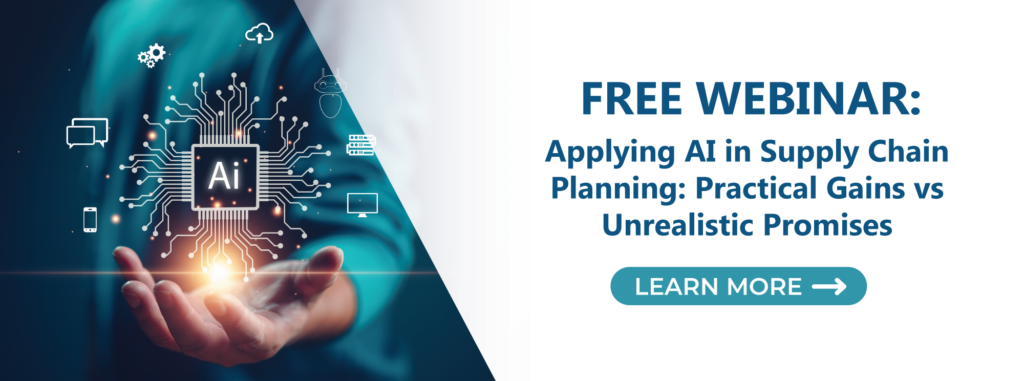Artificial Intelligence (AI) is dominating the conversation across supply chain events, software solutions and strategic planning discussions. The recent Gartner Supply Chain Symposium was no exception (you can read my key takeaways from the event here).
From the talks from the analysts, practitioners and vendors, it was difficult to miss. In fact, almost every supply chain software provider, including Arkieva’s competitors, showcased AI prominently in their messaging. I was even asked directly: “What is Arkieva doing with AI?”
This led me to think: If I go beyond hype, what is the actual usage of AI in the field of supply chain planning? What are the applications that have already proven their worth? Which ones are at the cusp of success? Which one do not have any hope (at least in my eyes)? Which ones have already failed?
The Historical Context: From Information Advantage to AI Agents
Humans have always used data and information around them to make decisions. In the old days, when the information was at a premium and the available was asymmetric, those with better access to data and information stood at an advantage. They could exploit these asymmetries to create an edge for themselves.
Today, the information age has flattened many of those disparities. Data is more widely available than ever, but this abundance brings new challenges:
- Synthesizing vast amounts of data into actionable insights is increasingly difficult
- Time and cognitive load constraints make it harder to manually translate information into decisions
- The risk of noise over signal is higher than ever
Enter AI-powered solutions, promising to bridge this gap through decision support, augmentation and in some cases, autonomous action.
Practical AI in Supply Chain Planning: Current Applications
Supply chain planning, which is inherently forward-looking, makes it a field ripe for such intervention. Be it the old AI techniques such as Optimization, or Simulation or Rules and Heuristics, or the new ones such as generative AI, one can easily see the benefits of better predicting the future. Here’s how AI is currently being applied:
- Predictive AI: Algorithms aim to anticipate demand, disruptions and supply chain variability.
- Caveat: Predicting the future is very difficult, and even the most sophisticated AI does not change that fact.
- Generative AI: These solutions make the lives of the users a lot easier by letting them interact with models and results in more intuitive language-based ways.
- Agentic AI: “Agents” can wake up and do the job autonomously. This generates imagery of touchless planning or lights out factories.
What’s Working and What’s Not
While AI in supply chain planning often comes with lofty promises, there are areas where it is already delivering measurable value. Organizations are seeing meaningful improvements in forecast accuracy, even in complex and volatile environments, where traditional models often fall short.
Natural language processing is also beginning to streamline scenario analysis, making it faster and more intuitive for planners to explore “what-if” situations without needing specialized technical skills. Additionally, intelligent automation is helping to offload repetitive planning tasks, allowing teams to focus more on strategic initiatives rather than administrative work.
However, not every AI ambition is being realized. Full autonomy, where AI independently manages planning without human oversight, remains largely theoretical and faces significant technical and practical barriers. Visions of fully “lights-out” supply chain operations, where every link in the chain operates without manual intervention, are still far from reality for most organizations. Similarly, the idea of universal predictive models that always anticipate disruptions with perfect accuracy is more aspirational than achievable given the inherent uncertainties in global supply chains.
Understanding the difference between what AI can realistically achieve today and what remains speculative is critical for organizations seeking to invest wisely and build sustainable, future-ready supply chain strategies.
Join the Conversation: Webinar on June 18th, 2025
To explore these topics in more detail, I invite you to join me on June 18th, 2025, for a special webinar: Applying AI in Supply Chain Planning, Practical Gains vs Unrealistic Promises.
During the session, we’ll examine real-world examples where AI has made a tangible difference in planning outcomes, identify red flags to watch for when evaluating AI capabilities and discuss practical strategies for future-proofing your planning processes in an AI-driven environment.
Please join me.






